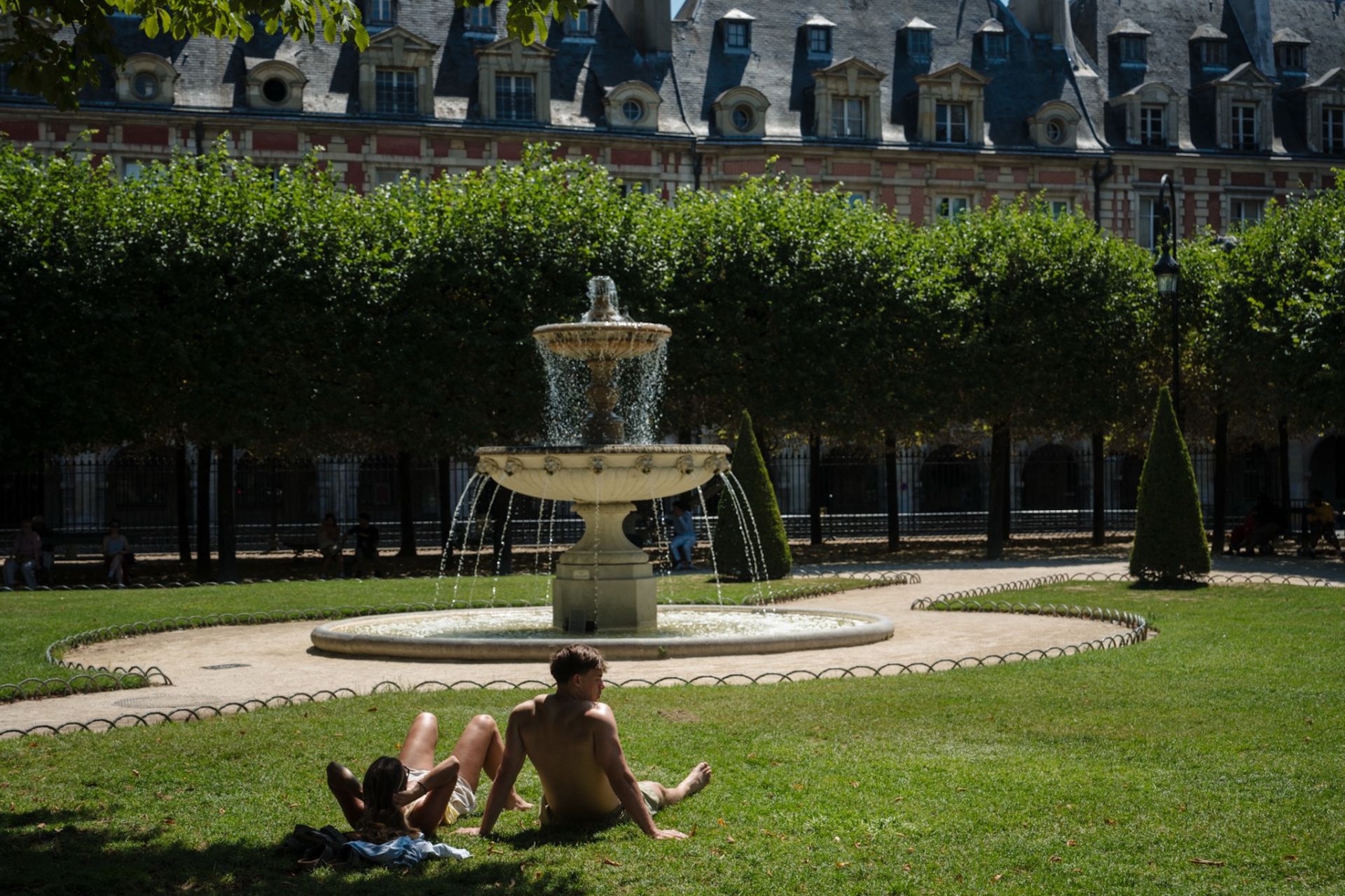- Home
- Middle East
- Europe on High Alert as Surprise Early Heatwave Creeps North

A couple sunbathes at the Place des Vosges in Paris, on July 1, 2025, as temperatures in France are expected to hit a peak today, according to the Meteo France weather agency, with some areas expected to soar beyond 40 degrees Celsius (104 degrees Fahrenheit). ©Dimitar Dilkoff / AFP
Europe on high alert as surprise early heatwave creeps north
Paris, France
01/07/2025 - 19:03 (UTC + 3)
Schools were partially shut in France, iconic monuments closed to tourists, and cities across Europe put on high alert as a record-breaking early summer heatwave spread across the continent Tuesday.
Withering conditions that have baked southern Europe for days crept northward, where such extremes are much rarer, with Paris on "red alert" and high-temperature warnings issued in Belgium, Switzerland and Germany.
Tens of thousands of people have died in Europe during past heatwaves, prompting authorities to issue warnings for the old and young, the sick, and others vulnerable to what experts call a "silent killer".
Scientists said it was unusual for such heat to hit Europe this early in the season, but that human-caused climate change from burning fossil fuels was making these once-rare events far more likely.
Records have tumbled, with France and Portugal experiencing their highest-ever single-day temperatures in June, Spain its warmest June, and the Netherlands its hottest opening day of July.
In England, the weather service said it was the hottest June since records began in 1884.
The Mediterranean Sea recorded a new June high of 26.01 degrees Celsius on Sunday, just the latest abnormal marine heatwave in the basin, harming sea life and turbocharging storms.
The summit of the Eiffel Tower was shut for a second straight day and was due to remain closed on Wednesday.
On Tuesday in Brussels, the city's Atomium monument, famed for its giant stainless steel balls, was exceptionally shut as temperatures reached 37 degrees Celsius (98 degrees Fahrenheit).
'Living like moles'
Under scorching skies, Paris imposed its first "red alert" in five years, empowering officials to limit or ban sporting events, festivals and school outings for children.
The heat is expected to peak on Tuesday, with Paris facing highs of 38°C, but authorities have extended the alert into Wednesday.
Some parks will remain open all night, pools have extended visiting hours, and cooling centers in churches and museums are offering respite from the lack of greenery and concrete surfaces that amplify the heat.
"We're living a bit like moles," Nicole, 85, told AFP in the stifling air of her apartment in a tower block in Paris.
Across France, the government said it expected nearly 1,350 schools to be partially or completely shut, with teachers complaining that overheated and unventilated classrooms were making students unwell.
Authorities are fanning out to check on the elderly, chronically ill and the homeless.
"When it's cold, I add blankets and hats. But when it's hot like this, what can I do? Nothing, just wait for it to pass and hope I don't faint," said Jo, a 55-year-old homeless man in Bordeaux, in southwestern France.
As far north as the Netherlands, some regions were placed on the second-highest alert on Tuesday, with temperatures forecast to reach 38°C.
Schools in Rotterdam and across West Brabant province adopted "tropical schedules" to ensure students started and finished earlier to avoid the worst of the day's heat.
In Germany, temperatures could peak at 40°C on Wednesday.
In Spain and Portugal, where highs of 46°C were recorded in some locations over the weekend, a level of respite was expected, though temperatures could still exceed 40°C in parts.
A two-year-old boy died in northeastern Spain on Tuesday after being left in the back of a car parked in the sun, police said.
'Silent Killer'
The International Federation of Red Cross and Red Crescent Societies (IFRC) said its teams of volunteers had mobilised across Europe to give out water and assist the most vulnerable.
"Extreme heat doesn't have to be a disaster: knowledge, preparedness and early action make all the difference," said IFRC spokesman Tommaso Della Longa.
Samantha Burgess, deputy director of the EU's Copernicus Climate Change Service, said despite cities taking strides to adapt to heatwaves, this latest episode was still exposing millions of Europeans to danger.
"We're still seeing infrastructure challenges associated with heatwaves, pressure on national healthcare systems, and we still have excess deaths," she told AFP.
A heatwave in 2022 killed an estimated 60,000 people across Europe, mostly elderly.
The World Meteorological Organization said Tuesday that heat was a "silent killer" and the death toll from prolonged, extreme exposure was often under-reflected in official statistics.
Spokeswoman Clare Nullis said every death from heat was unnecessary, and society would have to adapt to more heatwaves in future.
"It's something we have to learn to live with," Nullis said.
She added: "What can we expect in the future? More of the same, even worse."
AFP
Comments